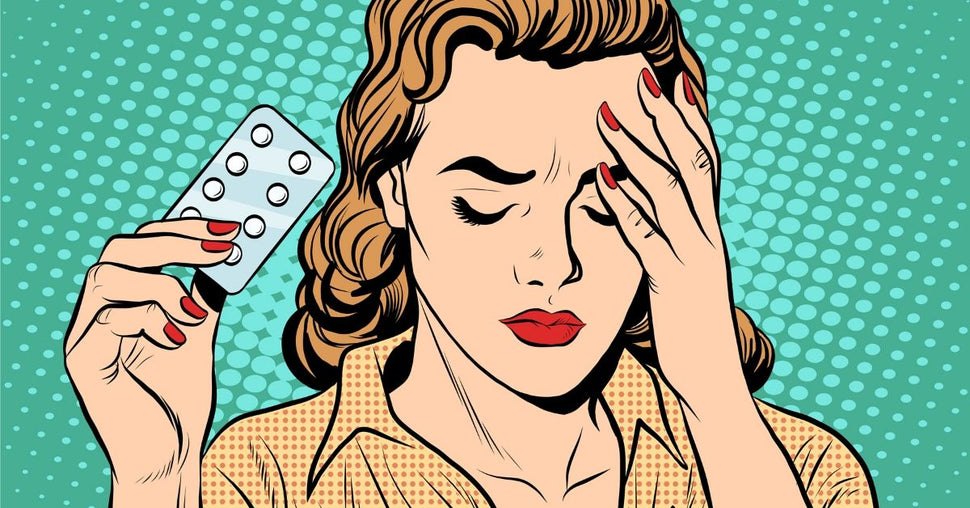Side Effects of Contraceptive Pill
01 Feb 2020
Waking up after an exciting night and realizing that you have to pop in a birth control pill because you forgot to use protection can be frustrating, but also reassuring. Frustrating because you know they’re going to mess up your hormones, you’ll have no control over your moods and emotions whatsoever, and may even cause physical discomfort. Reassuring because it’ll help you minimize the risks of an unwanted pregnancy.
Just a few years back these pills weren’t half as popular as they are today because earlier, they were considered to have only one trait and that was to block pregnancy. However, today these pills are used for several other purposes. While starting with birth control pills, most of us know little about what to expect. While they’re supposed to do their job and prevent pregnancy, they are also hailed to help with syncing periods and improving acne . Whether you’re on birth control pills to manage a health condition or to enjoy an active sex life minus the pregnancy, birth control is a topic that can create quite a stir. So let’s unravel the mystery and understand the link (if any) between birth control pills and weight gain, and if there are any side effects of contraceptive pills.
Stories from others who havegained weight on birth control pills often deter women from trying it. However, the extra weight is usually temporary and is caused by fluid retention.
Also known as oral contraceptives, there are two types of birth control pills – combination pills which contain estrogen and progestin, and progestin-only pills. Both types are equally effective but before you make a choice, it’s important to understand how the pill works:
HOW THE PILL WORKS

Pregnancy occurs when the egg released by a woman’s ovary is successfully fertilized by aman’s sperm. The fertilized egg then attaches itself to the uterine lining, where it receives nourishment and develops into a fetus. Eggs are released about 14 days into the menstrual cycle, which is when the levels of estrogen and progestin in a woman’s body peaks.
Estrogen helps thicken the uterine lining to prepare for a fertilized egg. The peaked hormone levels signal the ovaries to release one or more eggs – this is called ovulation.
Oral contraceptives prevent pregnancy by suppressing ovulation. The pills are synthetic forms of the hormones estrogen and progestin. By regulating the hormone levels in the body, the pill prevents the egg from being released, which means there are now no chances of pregnancy. Moreover, the pill thins the uterine lining because of which fertilized eggs cannot attach to it. Over time, the usage of birth control pills can make your period lighter and more manageable as there would be a much thinner uterine lining to shed.
The hormones in the pill also increase the build-up of sticky mucus on your cervix, which makes it harder for the sperm to enter the cervix. So even if an egg is released, the sperm is unable to enter the cervix to fertilize it.
THE PILL & ITS SIDE EFFECTS

There is no conclusive scientific evidence that taking birth control pills causes weight gain. However, estrogen in high doses can lead to water retention and bloating, but this weight gain is usually temporary. Insulin resistance is another result of increased levels of estrogen. When the body becomes insulin resistant, the blood glucose level increases, leading toweight gain. The estrogen and progestin in the pill are also known to boost your appetite, which may result in weight gain if not counteracted with diet and exercise. If you are worried about putting on weight while on the pill, consider increasing your daily physical activity. In addition to that, incorporate healthier food choices in your lifestyle to limit the intake of calories.
Nausea is another commonly reported side effect of the pill. Some people experience nausea when they first take the pill, but it usually passes. The pill also increases the chances of headaches and migraines. So, it is important to inform your doctor of any headache or migraine history.
Studies suggest that oral contraceptives can affect your mood and increase the risk of depression. Some women tend to get irritable and suffer from mood swings while on the pill. Women have also experienced breast tenderness while taking the pill. Breasts are sensitive to high levels of estrogen and can seem sore and sensitive during the first month of your pill cycle.
If you experience any of the above-mentioned side effects, don’t write off the pill just yet. Consult a doctor to discuss your options, which will help determine what works just right for you.
Take Away Tip
There are a few side effects of birth control pills, but if you wish for an active sex life without the constant fear of unwanted pregnancy, contraceptive pills might be a good option for you. However, it is suggested that you do your research and make an informed decision. Consulting your doctor and having an open conversation with your partner can also help. In fact, if you think it’s appropriate, you can also talk to your family members and friends. Also, keep in mind that what worked for others may not work for you. The right contraceptive choice for you is what fits your lifestyle and your health needs.
Skin: Renew - Glutathione - Orange Flavour
- ₹1,996
- ₹1,996
-
₹2,800 - ( 28% OFF)
Categories
- Choosing a selection results in a full page refresh.
- Press the space key then arrow keys to make a selection.
this is the sidecart










